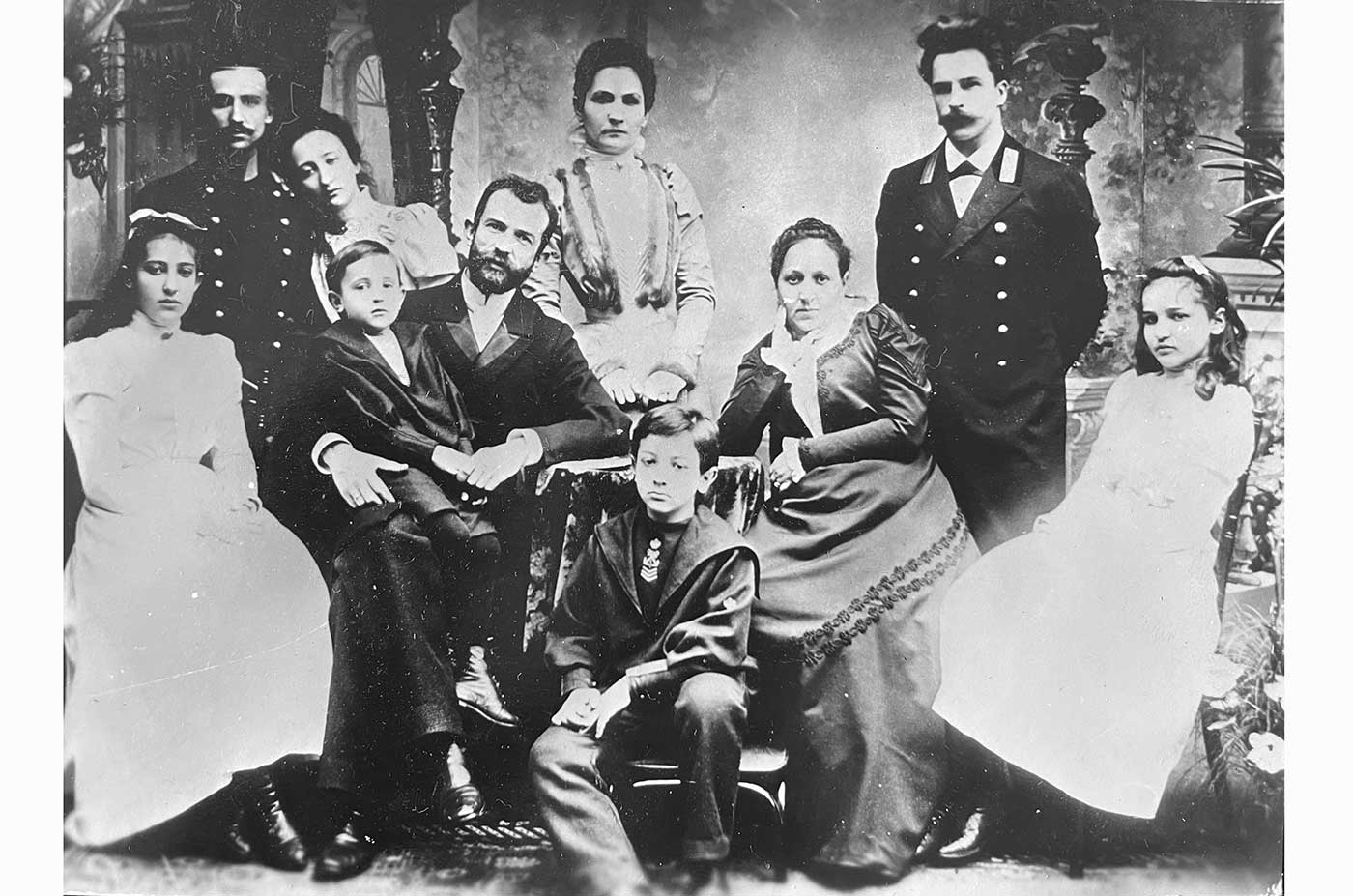Vladimir Youlievitch Grunberg
Vladimir Grunberg is the son of Youli Grunberg and Marie Gindus. His father was an adopted child from Hungary who fell in love with his future wife and followed her to Russia. Initially an accountant, he became director of the literary gazette Niva and of Marx Editions which published the books of many writers who became famous, including those of Tolstoy. Vladimir, or Volodya, is the youngest of six siblings.

La famille Grunberg en 1900
Photo famille manago
In this Grunberg family photo, Vladimir is sitting on his father's lap. In the first row on the left is his sister Isabella, who remained in Russia, whose portrait the painter Serov, who in love with her (but without success), will draw. In front in the center is his brother Eugene who will emigrate to Paris and become a ballet impresario. On the right is his sister Elisaveta , wife of Metzel, who emigrated to Berlin and then to Paris and who is the mother of the star dancer of the Paris opera Youli Algaroff. In the second row to the right of Youli Grunberg is his wife Marie Gindus. Third row from the left is his brother Emile, mayor of a small Crimean village who married Baroness Olga de Wrangell and was murdered in an ambush. Her head resting on Emile's shoulder, his sister Ludmila who will marry Dimitri Rachmanoff. The latter is in the photo in the last row on the right because at the time he and Ludmila were only engaged and it was not appropriate for them to be side by side in the photo. Finally, to Ludmila's right is his aunt Anna Grigorievna Gindus, whose portrait Serov painted in 1910 (this painting is now on display at the Belarusian National Museum of Fine Arts in Minsk). Anna Gindus was a well-known fashion designer in Saint Petersburg.
During the fall of 1918, Volodya Grunberg met Ekaterina Riasanoff who would become his wife. Volodya often talks to her about his family which includes many artists and musicians. Their meeting in the architect's studio Fomine, his arrest for having sung anti-Soviet songs and release, the birth of their daughter Marianne and their escape from Russia to Germany and then France is described in the biography of his wife on this site.
Arriving in Paris, Volodya, Katia and Marianne settle into a large apartment on rue Boucicaut with other members of the family. To earn a living, Volodya embeds precious stones in cigarette boxes for Cartier with the help of Andreï, Katia's brother. The latter is responsible for cutting the mother-of-pearl decorations with a saw. This fragile material frequently breaks and you have to start all over again. For her part, Katia plays the model before becoming a housekeeper. The family became friends with Madame Guemand, a professor of classics and modern literature who lived in their building and recommended for Marianne a very small private school located in an apartment. To enter the municipal school, you need too many papers and complicated procedures. When Marianne entered this small school at the age of six, she only knew the basics of French taught by their neighbor. One day in class instead of saying “exposure,” she said “explosion,” triggering mocking laughter from her classmates. All her life, Marianne remembered with gratitude her teacher's astute reaction. The latter asks the little girl to say a word in Russian which she then makes those who were quickest to laugh repeat. They are incapable of pronouncing the word in question and it is Marianne's turn to enjoy this good lesson.
On August 6, 1931, his son was born, baptized Youlik in memory of his illustrious grandfather, in Neuilly sur Seine. At this time, thanks to his brother Genia (Eugène), who evolves in the world of dance, Volodya created graphics for ballet programs and for a magazine devoted to dance.
When in 1933, Genia decided to go to Nice to film “Les Miserables”, he persuaded his younger brother to follow him with his wife and children, promising him a job as an extra in the film. After performing as an extra, Volodia was hired as a cellist in a folk orchestra which enlivened the evenings at the Hôtel Beaurivage. But this job only lasts the summer; the rest of the year the waltz of odd jobs resumes. The family spent two years in Nice. It is perhaps for the schooling of Marianne, who absolutely hates her high school where she makes few friends, that the family - whose financial situation has hardly improved - decides to return to Paris.
